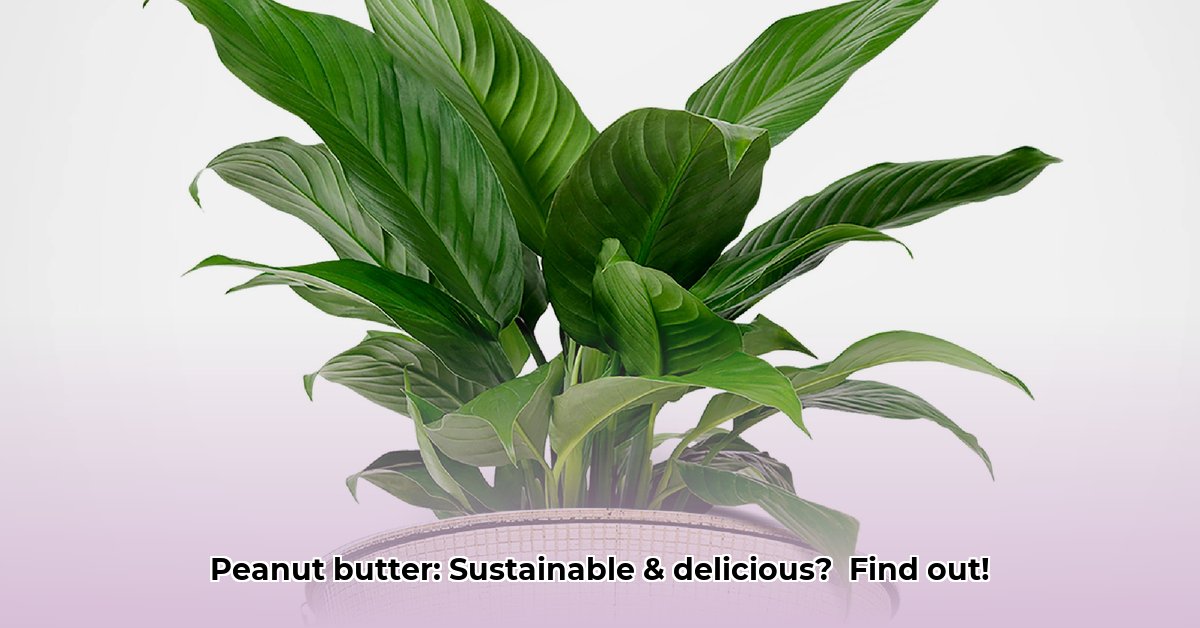Peanut butter is a beloved food, but have you ever considered its production methods and environmental impact? With the increasing popularity of plant-based diets, the demand for sustainable peanut butter is soaring. For more plant-based options, check out this helpful grocery list. This guide offers insights into the challenges and opportunities within the eco-friendly peanut butter market. We will examine the elements of sustainable peanut butter, compare well-known brands, and equip you with the knowledge to make environmentally conscious purchasing decisions. Let’s explore what makes a jar of peanut butter beneficial for both you and the planet.
Reducing the Environmental Impact of Vegan Peanut Butter Production
The popularity of peanut butter is growing, as is the demand for environmentally friendly alternatives. More people are beginning to understand that their food choices affect more than just their taste buds; they also affect the environment. Navigating the world of sustainable plant-based peanut butter can seem complicated, but understanding key factors simplifies the process.
Market Trends: Simplicity and Organic Choices
Consumers increasingly favor simple ingredient lists. A prominent trend in plant-based peanut butter is the rise of single-ingredient options, typically containing just peanuts and sometimes a touch of salt. This reflects a desire for transparency; people want to know exactly what they are consuming. Organic peanut butter is also gaining traction as consumers grow more concerned about pesticides and seek to support responsible farming methods. Data indicates a consistent rise in organic peanut butter sales year over year.
However, brands differ significantly. Some still utilize palm oil, which can lead to environmental issues. Palm oil production has been linked to deforestation, harming animal habitats and exacerbating climate change. Prioritizing organic and single-ingredient options is a positive start, but deeper investigation is often needed to ensure that our purchasing choices are genuinely sustainable.
Ethical Sourcing and Sustainability
Even organic peanut production has environmental implications. Growing peanuts requires significant water, particularly problematic in regions facing water scarcity. Transportation of peanuts also contributes to carbon emissions as they travel from farms to stores. Various certifications exist, such as organic and fair trade, but understanding their specific guarantees and effectiveness can be challenging. Reliable information can be difficult to obtain, making it harder to choose a truly sustainable brand.
Brand Analysis: Sustainable Peanut Butter
Examining specific peanut butter brands helps illustrate what truly constitutes sustainability.
Key evaluation criteria include:
- Organic Certification: Is the peanut butter certified organic by a reputable organization like USDA Organic or similar international bodies? This indicates the peanuts were grown without synthetic pesticides and herbicides.
- Palm Oil Use: Does the product contain palm oil? If so, is it certified sustainable by an organization like the Roundtable on Sustainable Palm Oil (RSPO), ensuring it’s sourced without contributing to deforestation?
- Fair Trade Practices: Does the brand adhere to recognized fair trade guidelines, ensuring fair prices and safe working conditions for farmers and laborers? Look for Fair Trade USA or similar certifications.
- Transparency: How transparent is the brand about its sourcing and production processes? Does the company provide clear information about where its peanuts come from, how they are grown, and their environmental impact?
- Packaging: Is the packaging recyclable, compostable, or made from recycled materials? Look for certifications like Forest Stewardship Council (FSC) for paper-based packaging.
| Brand Name | Organic Certification | Palm Oil & Sourcing | Fair Trade Certification | Transparency Level | Packaging Material |
|---|---|---|---|---|---|
| Sunny Spread | USDA Organic | No Palm Oil | Fair Trade USA | High | Recyclable Glass Jar |
| Earth’s Best | USDA Organic | RSPO Certified | None | Medium | Recyclable Plastic Jar |
| Nutty Natural | None | Non-Certified | None | Low | Non-Recyclable Plastic Tub |
| Crunchy Choices | USDA Organic | No Palm Oil | Fair Trade USA | High | Compostable Pouch |
Important Note: This table is an example. Verify the sustainability of any brand through independent research.
Consumer Guidance: Making Informed Choices
Here are some essential points to consider when selecting peanut butter:
- Ingredient Lists: Simpler is better. Ideally, look for peanuts and salt. Extensive lists of additives raise questions about processing and potential environmental impacts.
- Certifications: Seek out credible organic and fair trade labels. These certifications indicate adherence to defined environmental and social standards. Research the certifying body to ensure its credibility.
- Palm Oil: Avoid brands using palm oil unless they provide verifiable evidence of sustainable sourcing through certifications like RSPO.
- Transparency: Does the brand disclose the origin of its peanuts and farming practices? Transparency indicates a commitment to ethical and sustainable practices.
Actionable Steps for Sustainability
More sustainable peanut butter consumption requires action from various stakeholders:
- Consumers: Support brands that prioritize sustainability through purchasing decisions. Contact brands to inquire about sourcing and practices.
- Brands: Embrace transparency. Invest in sustainable farming practices, explore palm oil alternatives, and reduce environmental impact throughout the production process.
- Farmers: Implement water-efficient techniques and sustainable farming methods to protect soil health and biodiversity.
- Regulators: Establish clearer, stricter standards for sustainable peanut production and labeling to support environmentally responsible businesses.
Sustainable Vegan Peanut Butter
Choosing sustainable peanut butter is about more than just a healthy snack; it’s about making informed decisions that reflect your values and contribute to a healthier planet. Research into peanut farming’s environmental impact continues, and widespread demand for greater sustainability is essential.
- Why Am I Always Thinking About Food? Your Body and Brain Explain - February 2, 2026
- Healthy Eating Is About Quality, Not Just Calories - February 1, 2026
- Healthy Living Products to Elevate Your Wellness Routine - January 31, 2026










